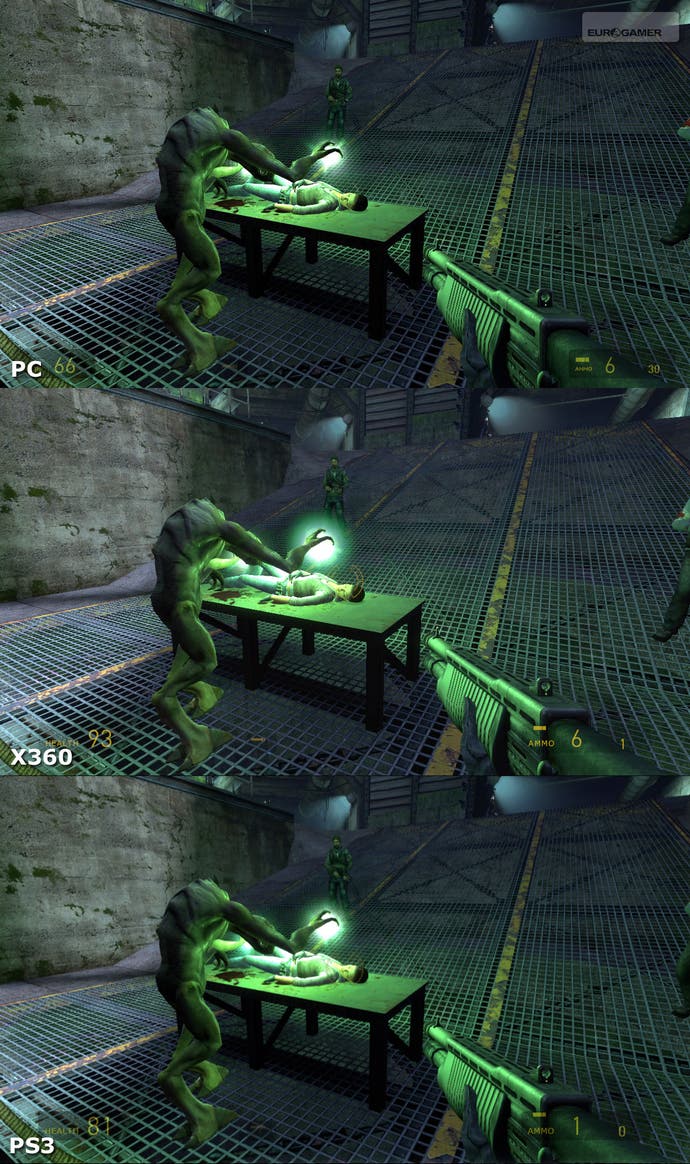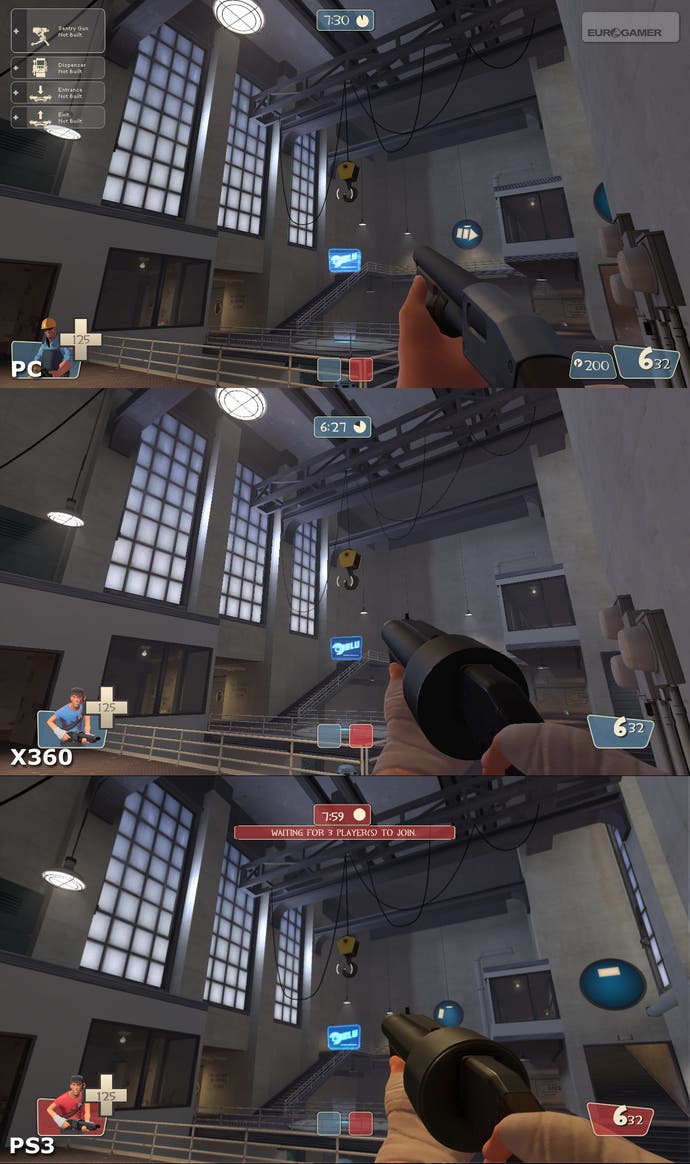The Orange Box
We pit EA's port against PC and 360.
Screenshot Face-Off
So, onto the face-off screenshots then - and this time we've really pushed out the boat with comparison screens encompassing all versions: PC, Xbox 360 and PlayStation 3. The PC version was running on a 2GB Quad Core system with a 512MB Radeon 1900XTX, resolution set to 1280x720 and all settings on maximum: in short, the yardstick the console conversions need to measure up to.
- Half-Life 2 Comparison Gallery
- Half-Life 2 Episode One Comparison Gallery
- Half Life-2 Episode Two Comparison Gallery
- Portal Comparison Gallery
- Team Fortress 2 Comparison Gallery
The first thing to note is that the console games are a total match for the original PC release in terms of geometry and textures and from what I could see, absolutely nothing is missing despite the RAM disadvantages of the Sony and Microsoft hardware. The fact that the game is pegged at 720p definitely helps here as it automatically limits the amount of texture memory the visuals require. However, there are variations in lighting and tone-mapping cross-platform, as you would expect.
Xbox 360 is a very close match for the complete balls-out PC experience, but the notable omission of anti-aliasing makes game considerably more 'jaggy' than any of the other versions. PlayStation 3 - frame rate issues apart - matches the PC game and is even anti-aliased.

Unfortunately, someone somewhere within EA decided that the PS3 game should be afflicted with an all-pervading blur that masks much of the fine graphical detail. Its inclusion is completely inexplicable and the game looks a lot worse on a decent LCD panel. It's rather baffling as the same effect could have been achieved by lowering the resolution (thus increasing frame rate) then scaling it back up to 720p. Call of Duty 4 does this. Halo 3 does this. But weirdly, EA has opted for full-fat 720p and then blurred the whole screen anyway. Also, it appears that someone got rather carried away with the HDR lighting effects at certain parts of the game. Subtle and muted in most cases on PC, they've been ramped up a touch in places on 360, and occasionally pushed beyond the limits of taste on PlayStation 3. Again, very puzzling and utterly pointless.
Scores on the Doors
In putting together the face-off, one thing is supremely obvious. These are PC games that work best on the original platform. Get the game running on a decent LCD or Plasma, kit yourself out with a decent graphics card and you're going to get an experience that utterly annihilates both console versions. Indeed, even my lowly 1.5GHz dual core laptop with a low-power 128MB nVidia 8400M GS ran the resource draining Episode 2 fairly well once the video settings had been appropriately tweaked - astonishingly it actually performed better than the same game running on PlayStation 3. Also, having worked with the console versions for some weeks, returning to the PC version was a revelation; the level of precision afforded by the mouse and keyboard combo is untouchable and this is definitely the way the games were meant to be played.

The Xbox 360 game is inherently a compromise, but crucially it works. You never feel held back by the technology or the technical quality of the conversion, and the astonishing amount of content on offer is hugely impressive. Also worthy of note are the cunningly engineered Achievements. I've completed Half-Life 2 on both PC and original Xbox, but I did it again on 360 simply for the lure of the gamerscore, posing as it does an excellent array of additional challenges you simply wouldn't be bothered taking on if there weren't points at stake. On PC, only Team Fortress 2 and Portal have their own Achievements and disappointingly there are none at all on PlayStation 3.
Coming to an overall score for The Orange Box for PS3 is difficult. In terms of game content, everything (bar the Achievements) is there. Half-Life 2 is still an excellent game, even if it does feel overly long and a touch dated graphically. Episodes One and Two feel much more 'modern', faster-paced and more attractive, but the compromises in the PS3 version are simply unforgivable; Episode Two in particular is a savage testament of all that is wrong with cross-platform development - one of the worst examples as yet of developers simply not bothering to properly make use of the hardware available to them. Portal and Team Fortress are superb games, but the latter in particular emphasises that even the less technically challenging environments found in The Orange Box lack the polish found in the 360 game, and are lightyears away from the standards set by the original PC code.
So, an 'eight' it is for PS3 Orange Box then, but with it, the stark reality that most of that score is attributable to the superb quality of the core Valve games rather than the shoddy conversion work which sees one game out of the five ruined, and another badly compromised. That being the case, if you own a PC, even a relatively lightweight one, that version will almost certainly be the better - and definitely cheaper - purchase.
